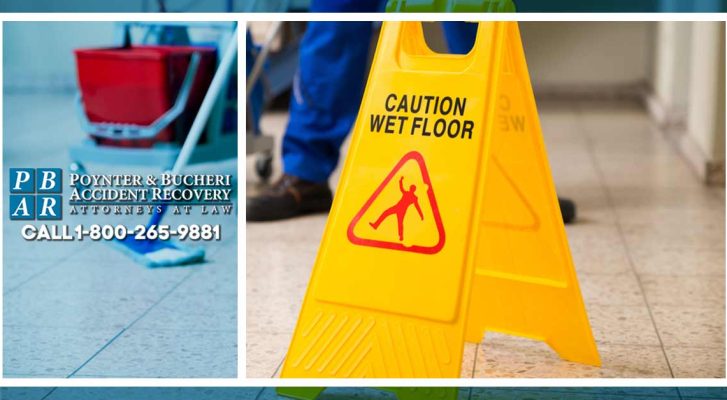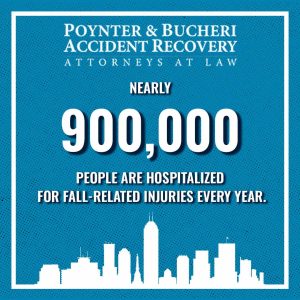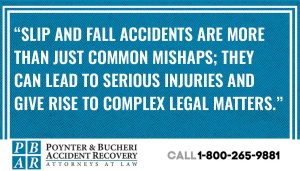
Liability Issues in Slip and Fall Accidents

Slip and fall accidents are more than just common mishaps; they can lead to serious injuries and give rise to complex legal matters. Understanding liability in these incidents is crucial, as it determines who bears responsibility for the accident and its consequences. In this blog, we’ll explore the intricacies of liability issues in typical slip and fall accidents, shedding light on the factors that influence legal responsibility, including premises liability laws.
From identifying an unsafe condition to examining property owner obligations, we’ll navigate through the key elements of injury claims that play a pivotal role in determining premises liability in the aftermath of a slip and fall incident. Whether you’re a victim who suffered injuries seeking compensation or a property owner aiming to enhance safety measures, gaining insights into liability issues is essential for informed decision-making and pursuing a slip and fall case. An experienced attorney can answer your premises liability law questions and assist you with your slip and fall lawsuit today.
Establishing Clear Liability for Your Slip and Fall Injuries

Nearly 900,000 people are hospitalized for fall-related injuries every year. In slip and fall accident cases, determining liability for your injuries is key. If you file a premises liability claim or claim against the insurance company, you must prove the property owner, landlord, or business owner’s full or partial negligence directly caused your accident. To accomplish this, your personal injury lawyer will establish that the defendant owed you a duty of care, negligently failed to protect that duty with an unsafe condition, or failed to take reasonable precautions, and this breach was the proximate cause of your slip and resulting harm.
Even if the property owner acted carefully, their actions or inactions leading to your fall will build your personal injury case. The evidence gathered, finding expert testimony, and ultimately persuading insurers or a jury that someone else’s negligence led to your hospital trips, pain, income losses, etc. is crucial to getting full and fair compensation in the end of a slip and fall lawsuit.
Conditions That Make an Accident More Likely
Slip and fall accidents often happen without warning, but there are frequently hazardous property conditions that increase the chances of taking a dangerous spill.
Being aware of these common factors allows both property owners and visitors to take reasonable steps to stay safe.
- Wet or icy surfaces
- Poor lighting
- Clutter
- Damage
When a property owner fails to identify and resolve slip and fall hazards on government property or commercial property, a slip and fall lawyer can come in to build a premises liability case.
Indiana Winters Present Higher Risk of Falls and Accidents
If you live or work in Indiana you know that with winter comes cold temperatures and plenty of snow and ice. As the weather turns, and ice and snow start to take hold all over Indiana, it is important to take extra care in navigating roads, parking lots, and entering/exiting their places of employment or other businesses such as shopping malls or grocery stores to avoid dangerous conditions.
Common Types of Slip and Fall Injuries
Slip and fall accidents, especially on someone else’s unsafe property, can leave you with a variety of injuries that range in severity.
These are some of the most frequently sustained types of injuries when people unexpectedly take serious spills due to a hazardous condition.
- Sprains and strains
- Broken bones
- Traumatic brain injuries (TBIs)
- Back injuries
Liability of the Property Owner
Understanding a property owner’s responsibilities is important in determining if they failed to exercise reasonable care against hazardous conditions.
- Provide proper indoor flooring
- Outdoor area maintenance
- Regular inspections & timely warning signs
In premises liability cases, the responsibility falls on the store owner and managers to consistently monitor their properties, make improvements to risk factors under their control, and warn visitors of any known dangers – or they can be held liable for slip and fall injuries occurring onsite. Documenting when inspections and repairs occurred also shows diligence on a property or business owner’s part. By failing to do what’s reasonably expected and necessary to offer safe entry and walking conditions, a property owner can be considered comparatively negligent.
Examples of Premises Liability Cases
Indiana courts have presided over many premises liability claims involving customers or visitors injured on another’s property. Some real-life examples of these types of injury claims and slip and fall settlements include:
An Indiana resident secured a $510,000 award following a slip and fall at an Indianapolis YMCA. The incident occurred as she was returning to a locker room after a swim class. The fall resulted in a dislocated and fractured left shoulder, necessitating a shoulder replacement. In response to the plaintiff’s injuries and medical bills, she pursued legal action against the YMCA, ultimately leading to substantial compensation.

An Indiana woman slipped and fell on an icy sidewalk outside of a grocery store. She won a slip and fall lawsuit against the property owner despite them appealing the decision as they claimed they were not responsible for the area where she fell.
These real-life premises liability scenarios help demonstrate some of the types of injury claims in the state that focus on property negligence leading to customer or visitor accidents. They highlight where owners often fail to reasonably maintain their premises or warn visitors of hazards and are held responsible for resulting medical expenses.
Owner vs. Occupier Negligence
In slip and fall cases in Indiana, it’s crucial to know who’s responsible—whether it’s the property owner or the occupier/tenant. A property owner owns the place, while occupiers handle day-to-day stuff. Owners must make sure the place is safe, including floors and lighting. Occupiers need to take care of visitors by cleaning up spills fast and putting up signs for wet floors. If someone gets hurt, a slip and fall attorney figures out if the owner or occupier didn’t do their job, causing the accident and harm and allowing the injured party to recover damages.
Examples of Conditions Leading to Slip and Fall Accidents
Slip and fall accidents can occur in various circumstances including:
- Hazardous conditions such as wet or slippery floors in places like grocery stores or malls
- Poorly maintained sidewalks with cracks or uneven surfaces
- Inadequate lighting in parking lots, stairwells, or hallways
- Insufficient warnings or signage for potential dangers
- Workplaces with cluttered or poorly organized areas
Being aware of these potential hazards and taking precautions is essential for accident prevention.
Slip and Fall Laws of Indiana
If you slip, fall, and sustain injuries as a result of a property owner or operator’s negligence, you may be able to recover compensation for your losses based on premises liability laws.
Statute of Limitations
The state of Indiana provides you with two years from the date of your injury to file a claim for damages. If you fail to submit your claim before the period ends, your slip and fall case will likely be dismissed.
Who Qualifies for Premises Liability Claims?
Indiana classifies entrants onto a property as either invitees, licensees, or trespassers. The duty owed depends on that status:
Invitees: Customers of businesses are invitees who are invited onto someone else’s property for the owner’s benefit. Owners owe invitees the highest duty of care to fix dangerous conditions or provide warnings such as a sign indicating wet floors or marking a worn or torn spot of carpeting.
Licensees: Social guests and others entering some one else’s property, such as a friend’s house, for their own reasons, with permission, are licensees. Owners must refrain from deliberately or negligently harming licensees and warn them of hidden dangers.
Trespassers: Those entering a property without permission don’t have an automatic right to sue but a property or business owner cannot deliberately harm them with unsafe conditions.
What Must Be Proven for a Premises Liability Claim?
To hold a property owner liable, an injured person must prove:
- The owner owed them a duty of care
- The owner breached this duty
- The breach directly caused the fall injury
Common scenarios violating the duty of care include failing to remove slippery substances from floors or put up a wet floor sign, eliminate tripping hazards, maintain safe stairwells, provide sufficient lighting, or warn visitors of dangers.
The Concept of Negligence : Contributory vs. Comparative Negligence
In order to have a successful slip and fall claim, you must be able to prove the property owner or operator where you got hurt was negligent in some way, and that negligence caused you to sustain an injury.
Indiana is a contributory negligence state. It is common for a property owner to refute a claim by stating that you share a portion of the blame for your injury because of your own carelessness. According to Indiana Code § 34-51-2-6, “the claimant is barred from recovery if the claimant’s contributory fault is greater than the fault of all persons whose fault proximately contributed to the claimant’s damages.”
In essence, this means if you’re found partially responsible for your slip and fall accident injuries, you may pursue compensation from the property owner, operator, or government entity (whoever is the negligent person), so long as you are no more than 50% responsible for the accident.
If you are deemed comparatively negligent and are awarded compensation for your injury, the amount will be reduced by the equivalent of the percentage of blame that is assigned to you.
For instance, you are awarded a total of $10,000 for your damages (including medical bills, lost income, pain and suffering, as well as other losses), and you are deemed to share responsibility for 10% of your injury. The compensation you receive will be reduced by $1,000, which is 10% of $10,000.
Typical Arguments from Property Owners
You can expect the property owner to defend him or herself against your claim. Some of the most common arguments property owners use against personal injury claims include:
- You were in an area of the property where you were not expected to be or where visitors are not typically welcome.
- You should have noticed the dangerous condition on the property.
- There were warnings about the hazardous condition, such as cones or signage.
- You weren’t paying attention to what you were doing and missed a dangerous condition when the slip and fall accident happened (for example, using a cell phone).
- The shoes you were wearing were unsuitable for the location you were in or what you were doing.
Poynter & Bucheri Accident Recovery- Indianapolis Slip and Fall Lawyers
If a business owner or operator’s negligence caused you to sustain an injury in a slip and fall accident, you may be owed compensation for your economic damages or non-economic losses. Don’t hesitate to reach out to our skilled team at Poynter & Bucheri right away to learn more about what our slip and fall liability lawyers can do to help with your situation and hold the guilty party legally responsible, especially in circumstances involving comparative negligence. We have helped many others with similar slip and fall cases and we may be able to help you recover the compensation you deserve for your slip and fall case, too. We will help you file your claim, gather evidence, and ensure the insurance company awards you the full amount you are owed.
Don’t hesitate — an experienced Indiana slip and fall liability lawyer can assist you right away. Call 1-800-265-9881 for a free case review.
